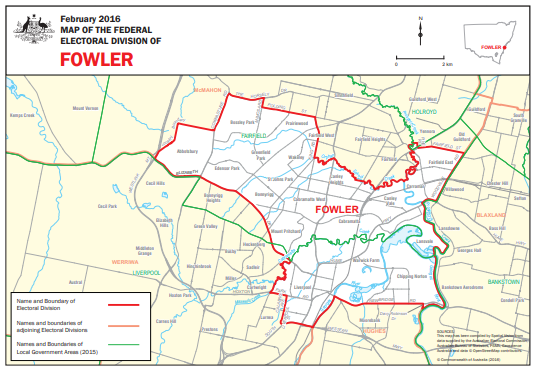|
|
|
|
| Adam Carr's Election Archive
|
Australian federal election, 2022
Division of Fowler, New South Wales
Named for: Lillian Fowler (1886-1954), first female mayor in
Australia, NSW MP 1944-50
South-western Sydney: Bossley Park, Cabramatta, Chipping Norton, Liverpool, Warwick Farm
State seats: Parts of
Cabramatta,
Fairfield,
Holsworthy,
Liverpool and
Prospect
Local government areas: Parts of
Fairfield and
Liverpool
Borders with:
Blaxland,
Hughes,
McMahon and
Werriwa
Enrolment at 2019 election: 106,975
Enrolment at 2022 election: 108,517 (+01.5)
1999 republic referendum: Yes 51.9
2018 same-sex marriage survey: No 63.7
Sitting member: Chris Hayes (Labor):
Elected (for Werriwa) 2005 by-election, 2007, (for Fowler) 2010, 2013, 2016, 2019. Retiring 2022
2007 Labor majority over Liberal: 18.3%
2010 Labor majority over Liberal: 8.8%
2013 Labor majority over Liberal: 16.8%
2016 Labor majority over Liberal: 17.5%
2019 Labor majority over Liberal: 14.0%
Liberal two-party vote 1983-2019
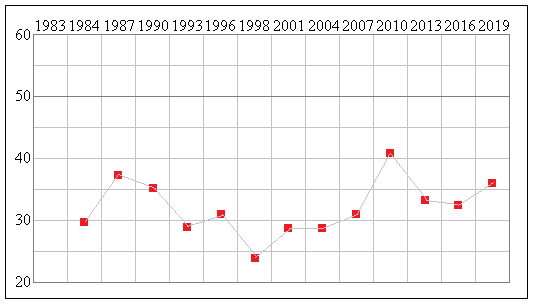
Status: Safe Labor
Best Labor booths, two-party vote: Cabramatta (80.5), Cabramatta South (79.0), Cabramatta West (78.7),
Bonnyrigg (78.5), Caney Heights (77.0)
Best Liberal booths, two-party vote: Chipping Norton (57.7), Smithfield West (57.5), Newbridge Heights (56.5),
Bossley Park (54.4), Bossley Park South (49.6)
2019 results
Statistics and history
Candidates in ballot-paper order:
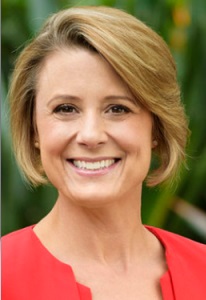 |
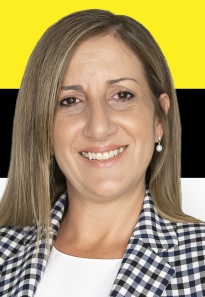 |
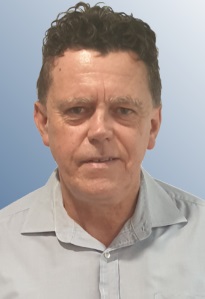 |
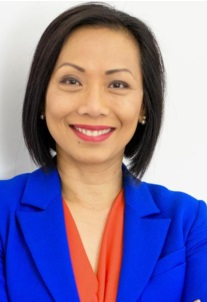 |
1. Kristina Keneally
Australian Labor Party |
2. Lela Panich
United Australia Party |
3. Peter Runge
Liberal Democrats |
4. Dai Le
Independent |
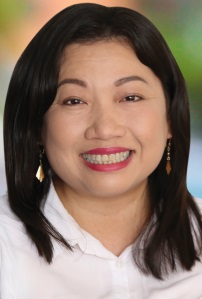 |
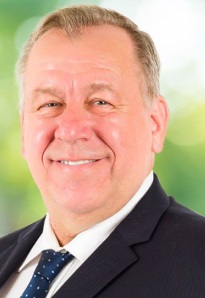 |
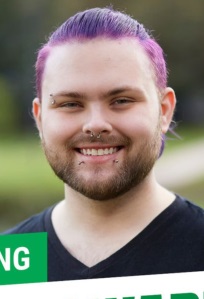 |
5. Courtney Nguyen
Liberal Party |
6. Tony Margos
Pauline Hanson's One Nation |
7. Avery Howard
Australian Greens |
Candidate websites:
Avery Howard
Dai Le
Kristina Keneally
Tony Margos
Courtney Nguyen
Lela Panich
Peter Runge
Division of Fowler
Fowler was created in 1984, based in the heartland of Sydney's south-western suburbs in the Liverpool-Cabramatta area.
Over the past 30 years this has become Australia's most economically and socially deprived urban area. Fowler usually has
among the highest rates of unemployment, of families in poverty, and of people with no post-school qualifications, of
any urban seat. The electorate also has the country's highest proportion of people born in non English speaking countries,
the bulk of whom were born in South-East Asia. It has the highest proportion of non English speaking households (72%)
of any seat in Australia. It recorded at strong No vote in the 2018 same-sex marriage survey.
Not surprisingly, Fowler has always been a very safe Labor seat. But the Labor Party has never used this, one of its
safest seats, as the base for a candidate with ministerial, let alone leadership, prospects. Its first two members,
Ted Grace and
Julia Irwin, were undistinguished backbenchers. In 2010 Irwin retired, and the seat was used to accommodate
Chris Hayes, who had been displaced from
Werriwa.
Chris Hayes, Labor MP for Werriwa from 2005 to 2010 and for Fowler since 2010, was assistant national secretary of the
Australian Workers' Union and senior adviser to the Police Federation of Australia and New Zealand before his election.
He won the 2005 by-election in Werriwa caused by the resignation of
Mark Latham. The 2010 redistribution resulted in
John Murphy moving from the abolished seat of
Lowe to
Reid, and
Laurie Ferguson moved from Reid to Werriwa, requiring
Hayes to move to the vacant Fowler. This provoked a sharp swing again Labor in 2010, but Hayes has since restored Labor's
dominant position. He became Chief Government Whip in 2013 and has been Chief Opposition Whip since
2013. He will retire in 2022. In September 2021 Senator Kristina Keneally, former
Premier of NSW, won Labor preselection for Fowler. The Greens candidate is Avery Howard, a student.
Demographics:
Median weekly household income: $1,212 (Australia $1,438)
People over 65: 13.4% (Australia 15.8%)
Australian born: 40.0% (Australia 66.7%)
Ancestry: Vietnamese 16.3%, Chinese 11.2%
Non-English-speaking households: 72.3% (Australia 22.2%)
Buddhism 19.8%, Muslim 6.4%
Catholics 26.7% (Australia 22.6%)
No religion 13.1% (Australia 29.6%)
University graduates: 12.7% (Australia 22.0%)
Professional and managerial employment: 22.9% (Australia 35.2%)
Employed in manufacturing and construction: 29.7% (Australia 22.9%)
Paying a mortgage: 27.9% (Australia 34.5%)
Renting: 38.2% (Australia 30.9%)
Traditional families: 43.9% (Australia 32.8%)
Back to main page
| |

